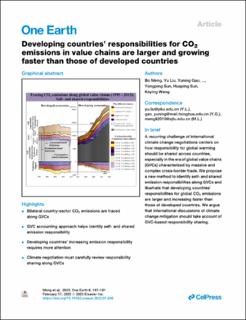| dc.contributor.author | Meng, Bo | |
| dc.contributor.author | Liu, Yu | |
| dc.contributor.author | Gao, Yuning | |
| dc.contributor.author | Li, Meng | |
| dc.contributor.author | Wang, Zhi | |
| dc.contributor.author | Xue, Jinjun | |
| dc.contributor.author | Andrew, Robbie | |
| dc.contributor.author | Feng, Kuishuang | |
| dc.contributor.author | Qi, Ye | |
| dc.contributor.author | Sun, Yongping | |
| dc.contributor.author | Sun, Huaping | |
| dc.contributor.author | Wang, Keying | |
| dc.date.accessioned | 2024-03-06T09:21:49Z | |
| dc.date.available | 2024-03-06T09:21:49Z | |
| dc.date.created | 2023-05-09T13:03:27Z | |
| dc.date.issued | 2023 | |
| dc.identifier.citation | One Earth. 2023, 6 (2), 167-181. | en_US |
| dc.identifier.issn | 2590-3330 | |
| dc.identifier.uri | https://hdl.handle.net/11250/3121218 | |
| dc.description.abstract | Carbon emissions associated with international trade are significant. The emergence of complex global value chains (GVCs) in recent decades, in which a country can operate as both a consumer and producer simultaneously, has led to a further rise in emissions. The complexity of these GVCs makes it increasingly difficult to determine what country is responsible for the emissions embodied within them. Here, we propose a new method based on input-output analysis to identify and distinguish self- and shared responsibility for CO2 emissions along GVCs, where self-responsibility describes emissions embodied in purely domestic value chains. Our results show that developing countries’ self-responsibility for CO2 emissions has been the largest driver in the growth of total GVC embodied emissions since 2001. Even considering the shared responsibility for emission transfers via GVCs, developing countries’ total responsibility has exceeded that of developed countries since 2012. We argue that climate negotiations should seriously consider GVC-based responsibility sharing to enable more effective climate policies. | en_US |
| dc.description.abstract | Developing countries’ responsibilities for CO<inf>2</inf> emissions in value chains are larger and growing faster than those of developed countries | en_US |
| dc.language.iso | eng | en_US |
| dc.publisher | CellPress | en_US |
| dc.rights | Navngivelse 4.0 Internasjonal | * |
| dc.rights.uri | http://creativecommons.org/licenses/by/4.0/deed.no | * |
| dc.subject | emission responsibility | en_US |
| dc.subject | global value chain | en_US |
| dc.subject | emission transfer | en_US |
| dc.subject | carbon leakage | en_US |
| dc.subject | climate change | en_US |
| dc.subject | trade in value added | en_US |
| dc.subject | input-output analysis | en_US |
| dc.subject | carbon neutrality | en_US |
| dc.title | Developing countries’ responsibilities for CO2 emissions in value chains are larger and growing faster than those of developed countries | en_US |
| dc.title.alternative | Developing countries’ responsibilities for CO<inf>2</inf> emissions in value chains are larger and growing faster than those of developed countries | en_US |
| dc.type | Peer reviewed | en_US |
| dc.type | Journal article | en_US |
| dc.description.version | publishedVersion | en_US |
| dc.source.pagenumber | 167-181 | en_US |
| dc.source.volume | 6 | en_US |
| dc.source.journal | One Earth | en_US |
| dc.source.issue | 2 | en_US |
| dc.identifier.doi | 10.1016/j.oneear.2023.01.006 | |
| dc.identifier.cristin | 2146424 | |
| cristin.ispublished | true | |
| cristin.fulltext | original | |
| cristin.qualitycode | 1 | |

